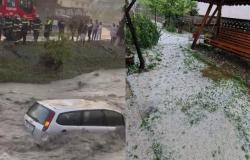The plaintiffs, Leonard Zaicescu and Ana Fălticineanu, are Romanian citizens born in 1927 and 1929, respectively. They live in Bucharest, are Jews and Holocaust survivors.
The case of Zaicescu and Fălticineanu v. Romania (application no. 42917/16) concerns the retrial and acquittal in the 1990s of two officers, convicted in the 1950s for war crimes and crimes against humanity committed through their involvement, among others, in the persecution of Romanian Jews in 1941, especially through their participation in the pogrom in Iasi, of which Mr. Zăicescu is a survivor, but also through the placement of a large number of Jews in ghettos, a situation in which both plaintiffs found themselves.
The two officers, presented only with their initials, respectively RD (lieutenant-colonel and former head of section in the Great Headquarters of the Army) and GP (lieutenant-colonel under the direct command of RD), were convicted by the courts of the People’s Courts , which were established in 1945 to prosecute and punish, along with other crimes, the massacre of the Jewish population, the ECHR notes.
After the fall of communism, in the 1990s several criminal trials related to war crimes were reopened, including those concerning RD and GP (both since deceased) whose convictions were overturned by the Supreme Court of Justice. The court acquitted the two army officers, noting that they would have been simple executors of the orders of their superiors regarding the deportation of the Romanian Jews and would not have had any involvement in the massacres of the Jews, which would have been carried out only by the German troops.
These processes would have taken place in public meetings with the appointment of legal representatives for the two deceased soldiers. The files regarding these procedures were filed for several years in the archives of the secret services and later in the archives of the National Council for the Study of Security Archives (CNSAS).
After accidentally learning about the acquittal procedures, during a conference organized by the National Institute for the Study of the Holocaust in Romania “Elie Wiesel” (INSHR-EW) in 2016, the applicants unsuccessfully tried to obtain access to the case files through the courts . Finally, they obtained copies of the respective files thanks to the efforts of INSHR-EW.
In the application that was submitted to the European Court of Human Rights on July 14, 2016, based on Article 3 (prohibition of inhuman or degrading treatment) and Article 8 (the right to respect for private and family life), both individually and and in conjunction with Article 14 (prohibition of discrimination), the applicants complained that the acquittal of the two soldiers, the holding of the retrial and the failure to inform them and the general public about the reopening of the proceedings,
deprived of an effective Holocaust investigation and affected their psychological integrity as Holocaust survivors.
The plaintiffs also complained that the authorities did not take into account the anti-Semitic nature of the facts under trial, thus making themselves guilty of discrimination.
In addition, based on article 6 para. (1) (the right to a fair trial), the plaintiffs complained about the lack of access to the acquittal files. The plaintiffs considered that the attitude of the authorities towards them constituted discrimination as provided for by Article 1 of Protocol no. 12 of the Convention (general prohibition of discrimination).
In the judgment published on Tuesday, the ECtHR found, in essence, that the return to historical convictions for crimes related to the Holocaust, in the absence of a reasonable justification by the government, caused feelings of vulnerability and humiliation for the victims of the Holocaust.
Also, the European court found that those retained by the Supreme Court of Justice in the acquittals of 1998 and 1999 – in particular the fact that only German troops carried out actions against Jews on Romanian territory and that the RD only executed the orders of a superior – have were apologies or efforts to mitigate
responsibility and to blame another nation for the Holocaust contrary to the well-established facts from a historical point of view, all of which are elements of Holocaust denial and distortion.
According to the ECHR ruling, being matters of public interest, the Romanian authorities should have made public the retrials and their results. The Court ruled that, because of this omission, the plaintiffs learned about the acquittals in question by accident, which may have caused them feelings of vulnerability and humiliation.
The European court also found that the Romanian government did not provide relevant and sufficient reasons for the review of historical convictions for crimes related to the Holocaust. The acquittals were therefore “excessive” and “unnecessary in a democratic society”, leading to a violation of Article 8 in conjunction with Article 14, the ECHR judged.
However, the complaints made in relation to the violation of Article 3 (prohibition of inhuman or degrading treatment) in conjunction with Article 14 were rejected by the Court, with a majority of votes, as inadmissible, since the inhuman treatment suffered by the applicants took place nine years before of the entry into force of the Convention and 50 years before Romania ratified the Convention, and the most important procedural measures that fell under the responsibility of the government were taken long before Romania became a High Contracting Party.
Also, the Court did not find evidence of violations of Article 6 para. (1) and of Article 1 of Protocol no. 12, so rejected these parts of the request as inadmissible.
The ECtHR determined that Romania must pay the plaintiffs the sum of 8,500 euros (EUR) as court costs and expenses. The decision is not final. During the three-month period from its pronouncement, the parties may request the referral of the case to the Grand Chamber of the Court. AGERPRES
Tags: survivor Iasi pogrom defeated Romania ECHR Ziarul Iasi
-





